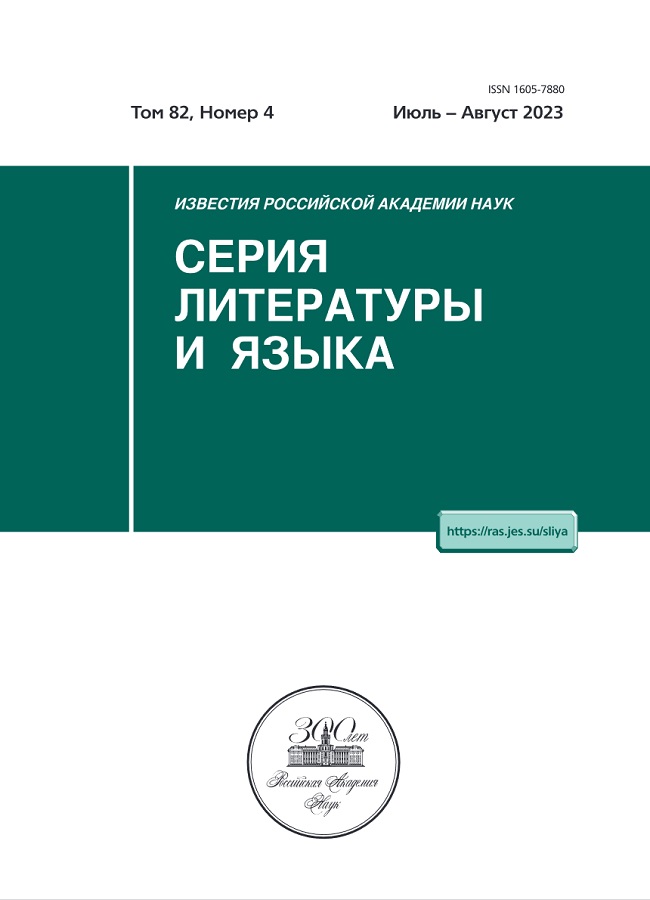V Nikuda (“To Nоwhere”): From Poeticism to the Element of Everyday Language
- Autores: Fufaeva I.V.1
-
Afiliações:
- National Research University “Higher School of Economics”
- Edição: Volume 82, Nº 4 (2023)
- Páginas: 55-62
- Seção: Articles
- URL: https://rjonco.com/1605-7880/article/view/656950
- DOI: https://doi.org/10.31857/S160578800027390-5
- ID: 656950
Citar
Texto integral
Resumo
The article deals with the results of a study of the history of the emergence and functioning of the Russian idiom в никуда “to nowhere”, which is a substantiated pronominal adverb of place никуда (“nowhere” or “anywhere” in different contexts) with the preposition of direction в (“to”). The idiom в никуда “to nowhere” is part of the expressive means of various styles of the modern Russian language, including colloquial speech and journalism, and the expressiveness of this idiom is due to the unusual, “irregularity” of its construction, which, in principle, is not typical for Russian speech. The analysis of the National Corpus of the Russian Language (NRC) showed that the idiom в никуда “to nowhere” is as stable as poeticism. In modern Russian, it is much more frequent in the poetic subcorpus of the NRC than in other subcorpora. The unit under study can be found in the works of poets of all directions, including such well-known ones as Brodskiy, Akhmatova, Tsvetaeva, Slutskiy, Heinrich Sapgir, Boris Ryzhiy, etc. Further, for the first time among the texts of the corpus, the described unit is found in the work of the symbolist poet Ivan Rukavishnikov, written no later than 1910. At the same time, in the first decades of its existence, unlike today, the unit в никуда “to nowhere” is found exclusively in poetic contexts and only from the late 1930s penetrates into everyday and journalistic discourses. The study was carried out using such methods as corpus analysis, the method of calculating the overall frequency of a lexeme, which in this case was applied to an idiom, and the source study method. The material was NRC data and Google.books collections. The history of the idiom в никуда “to nowhere” demonstrates the mechanism of the penetration of poeticisms into the national language.
Sobre autores
Irina Fufaeva
National Research University “Higher School of Economics”20 Myasnitskaya Str., Moscow, 101000, Russia
Bibliografia
- Национальный корпус русского языка. URL: https://ruscorpora.ru
- Рахманова Л.И., Суздальцева В.Н. Современный русский язык. Лексика. Фразеология. Морфология: Учебное пособие. М.: Из-двоМГУ, Издательство “ЧеРо”, 1997. 480 с.
- Петрова Н.Е. Субстантивация и деадвербиализация наречий в современном русском языке // Известия Уральского государственного университета. Серия 2: Гуманитарные науки. 2009. Т. 63. № 1–2. С. 35–42.
- Google.books URL:https://books.google.com/
- Ляшевская О.Н., Шаров С.А. Новый частотный словарь русской лексики. URL: http://dict.ruslang.ru/freq.php
- Шиян Л.И. Иван Рукавишников и его роман “Проклятый род” // Рукавишников И.С. Проклятый род. Н. Новгород: Нижегородская Ярмарка, 1999. С. 5–12.
- Крученых А.Е. Сдвигология русского стиха. Трактат обижальный. М., 1922. 48 с.
Arquivos suplementares










